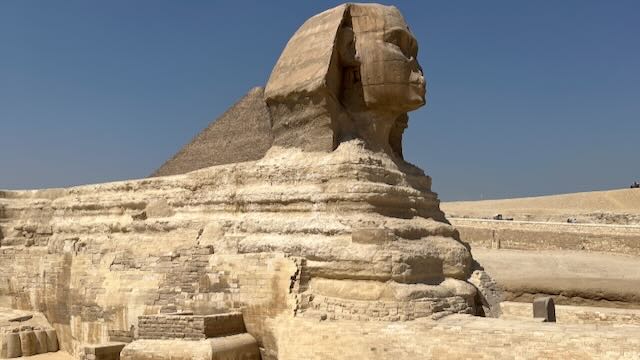
Because of the attacks in Israel this weekend, I held off on posting this second of two pieces about our recent ten-day trip to Egypt (part one is here). But since this has nothing to do with that — and you can find all the analysis you desire elsewhere, and I have nothing different to contribute, and there will never be a time when that part of the world isn’t in chaos — here are more of my observations from our first visit to Egypt.
I have been to a lot of cities, both in the US and other countries, but I have never seen traffic like I saw in Egypt.
Why? I blame it on the virtual lack of traffic lights. Without some sort of traffic control system at intersections, everyone just goes for it at the same time. Vehicles come in from the left, the right, behind, in front. The result is mayhem, and it’s not at all organized.
Instead, Egyptians — who never use their blinkers — rarely go ten seconds without hitting their horns, creating a cacophony that makes the mess seem worse. Even when traffic is flowing, drivers move around on a whim, the lane markings viewed as mere suggestions that aren’t followed by anyone. That’s especially true of those on motorcycles, none of whom wore helmets as they squeezed between everyone else with the assumption that a couple of beeps will be enough to keep them safe.
As if that wasn’t bad enough, there’s a near-constant stream of people on foot crossing the roads, even the highways. Some of them stand on the side waiting for the privately-driven shuttle vans that serve the same purpose as busses in other urban areas — without the benefit of bus stops. When you want a ride, you hold up your fingers in a certain configuration indicating your desired destination and wait for the appropriate van to come to a halt — in a traffic lane — and pick you up. If it has an open seat. These vans run on no schedule, and they stop in both the left and right lanes of the road. So do food trucks, where both pedestrians and drivers grab a bite, adding to the havoc.
I’ve never seen anything like it.
The entire infrastructure in and around Cairo is a mess. There are tangles of electrical wire hanging outside most buildings like gray spaghetti. When the ring road surrounding the city (leading to the pyramids and elsewhere) was expanded to add more lanes, apartment buildings nearby were cut in half. I don’t mean the height, I mean the width. The result is a lot of these odd half-structures with apartments full of families on one side and gaping holes on the other that no one is making any effort to fix. Others that haven’t finished being built have rebar sticking out of the tops of the pillars that hold the whole thing up, waiting for the next floor to be added.
There are two other constants I noticed as we moved about Egypt.
One is a patina of sand on everything, a layer that covers roads, buildings, signs, and all the rest. On breezy days, when you’re on foot, it gets in your eyes, which became a recurring problem for me. The other ever-present problem is litter. No matter where we were — in the city or in rural areas, in upscale neighborhoods or tourism venues — there was trash at the curb of every street. Some of it had been there so long it had grown into piles as people threw away more stuff. Even as we moved up the Nile by boat, we saw plastic bags and other trash floating by. It’s as if the entire nation has no sanitation department. Or wastebaskets.
Gas prices are incredibly low in Egypt, the equivalent of about a buck and a half per gallon. It helps that the country is closer to the source of the oil. Considering that, we were surprised in rural areas to see many farmers with carts full of sugar cane being pulled by donkeys. Considering how long it takes for them to get to market (or wherever they’re going) and then home, it doesn’t seem to be the most efficient delivery system. Then again, we’re talking about very poor people here for whom the donkey might be their most valuable possession.
One of our guides told us that Egypt is 75% Muslim and 20% Coptic Christians, but there are very few Jews. Gee, I wonder why.
When you’re cruising up the Nile on a riverboat in the middle of nowhere, don’t even bother trying to get a cell connection for your phone. We were effectively off the grid for three days.
When we checked into one of our hotels in Cairo, we were introduced to our butler. Our what? Yes, butler. But aside from carrying our bags and showing us the room, we didn’t have anything else for him to buttle. Maybe “butler” is Arabic for “bellman.”
We were told ahead of time there was no reason to exchange US dollars for Egyptian Pounds, because everyone would accept them. That was true, but we didn’t bring enough to tip all the guides and drivers, so we eventually had to take some EGP out of an ATM. But because the exchange rate is 30-to-1, we ended up with so many bills our wallets barely closed, which made me feel like George Costanza.
As our adventure wound down, our biggest concern was the news from home about the infighting amongst the extremist Republicans in Congress possibly leading to a shutdown of the US government. With federal employees not being paid, that would have impacted the air traffic controllers, which could have meant lots of cancelled flights, including our return trips.
Fortunately, that didn’t happen — or we might have had to move in with our butler.
